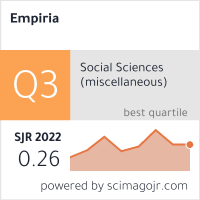Repensando la estructura de clases en formato comparativo en el marco de los procesos de heterogeneidad del mercado laboral en América Latina y Europa
DOI:
https://doi.org/10.5944/empiria.55.2022.34185Keywords:
heterogeneidad socio-económica, Esquema de clases, desigualdad, pobreza, América latina, Europa, socio-economic heterogeneity, Scheme of classes, inequality, poverty, Latin America, EuropeAbstract
The International comparative studies of social stratification and class mobility are based on class schemes designed for industrialized countries. One such scheme, the EGP scheme developed by Erikson and Goldthorpe, has become a standard in the field. The use of this scheme in other regions of the world, including Latin America, has been crucial for the comparative analysis. However, this scheme may not reflect heterogeneities in the prevailing labor relations in developing countries, where salaried and self-employment occupations are segmented into high and low productivity sectors, with unequal working conditions and remuneration. We propose an adaptation of the EGP scheme to take into account this heterogeneity. Based on this adaptation, subjected to various tests of coherence and empirical homologation, we use data from national household surveys in Latin American and European countries, characterize their class structures and analyze the association between class membership and living conditions. Our results indicate that this modified version of the EGP class scheme improves the characterizations of class structures, as well as our understanding of the structural foundations of poverty and income inequality in Latin America. For this we use household surveys, and a homogeneous codification of the uniform classifier of Occupations to be able to make the comparisons, along with harmonizing variables to develop the analysis.
Downloads
Downloads
Published
How to Cite
Issue
Section
License
Copyright (c) 2022 Empiria. Revista de metodología de ciencias sociales

This work is licensed under a Creative Commons Attribution-NonCommercial-ShareAlike 4.0 International License.
Los autores que publican en esta revista están de acuerdo con los siguientes términos:a) Los autores conservan los derechos de autor y garantizan a la revista el derecho de ser la primera publicación del trabajo al igual que licenciado bajo una Licencia Internacional Creative Commons CC BY-NC-SA 4.0.
b) Se permite y se anima a los autores a difundir electrónicamente las versiones pre-print (versión antes de ser evaluada) y/o post-print (versión evaluada y aceptada para su publicación) de sus obras antes de su publicación, ya que favorece su circulación y difusión más temprana y con ello un posible aumento en su citación y alcance entre la comunidad académica.










